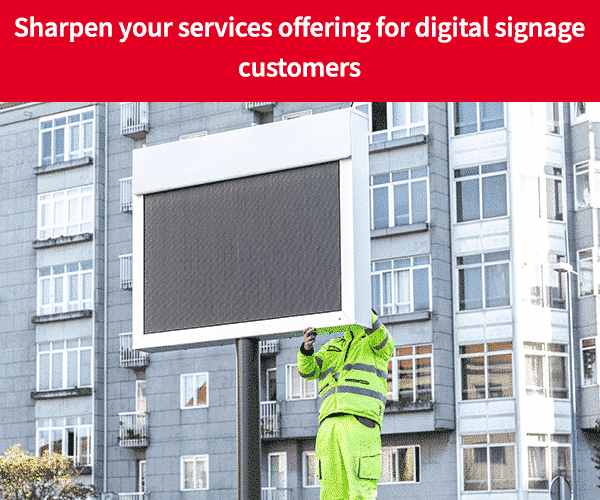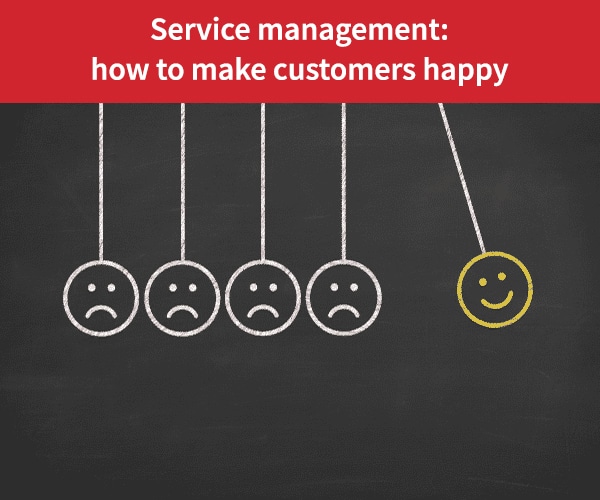
- Field Service Management
- Productivity
How companies that install and maintain digital signage systems can improve their service offering with field service management software
Demand is growing for digital signage among sectors as diverse as retail and healthcare. As the cost of digital signage has come down and providers offer more sophisticated packages it is not unusual to see digital advertising and information screens in more and more venues.
Above all, digital signage delivers results, with various surveys and studies showing that shoppers and consumers are more responsive to digital signage, over paper, translating into higher volumes of sales for an advertised product or service, or promotion. Unlike paper signage, digital technologies offer specific attributes and benefits, such as dynamic images, videos and messaging, as well as interactivity, in the form of touch screen displays and kiosks, for example. Digital signage continues to see uptake in its core retail market but is also seeing adoption across other sectors, including fast food restaurants, offices buildings and medical centres.
Signage solutions that are compatible with Android operating systems, along with more widespread adoption of IoT, cloud computing and other digitisation trends are also enabling collection of operational and marketing data, with digital signage functioning as the point of interaction between the customer and the provider of a product or service.
Key trends in the UK market
In 2022 digital signage providers in the UK are seeing an uptick in demand as retail – the main market – has begun investing in the technology, after a slump during the pandemic. Some are putting this down to the growth in “destination retail”, where people visiting stores, shopping centres, retail parks and high streets in cities, want experiences that only digital signage can deliver.
Whereas in the past retail organisations were motivated to install digital signage as a way to increase sales, promoting a specific product deal, for example, or to reduce operational costs, they are now investing in digital signage as a way to reinforce their brand and raise their profile.
The digital signage supply chain
The UK digital signage supply chain includes companies, large and small, that provide a range of services, from supply and installation through to aftersales services. Some digital signage providers serve a wide range of customers, including airports, retailers, hotel chains, football clubs, corporates and advertising companies, carrying out work equivalent to millions of pounds, in some cases. One Manchester-based provider recently clinched a £7m contract, following a competitive tender, comprising servicing, monitoring, management design, fabrication, and installation of digital roadside, rail, and airport advertising panels across the UK for a large media entertainment group.
Digital signage is a sophisticated market, with some providers offering their own content management software that is compatible with different display and signage hardware, so they are able to both deliver and manage digital signage infrastructure so that customers can focus on creating campaigns and advertising. Others provide audiovisual hardware for customers and maintain it on their behalf.
The digital signage industry has evolved to meet a range of budgets and requirements, from simple solutions to highly sophisticated platforms.
Business-critical infrastructure demands exceptional service
However, for any digital signage providers, customers and clients expect exceptional levels of service. Faulty, damaged or malfunctioning signage ceases to do its job, so companies must be able to respond to callouts, quickly.
Increase digital signage technicians’ productivity
Smart field service management solutions empower installation and service technicians working for digital signage providers to be more productive in the field, whether they are carrying out routine maintenance of signage hardware or responding to a callout to fix a fault. Field service management software in the form of an agile, customisable mobile app allows control over who can create, edit and reschedule jobs.
Empower technicians to increase their autonomy in the field
The app also enables self-scheduling of specific jobs while on-site. Whenever field technicians are in the same area, they have the option to assign themselves to a particular job. The software allows decision-making over which technicians can access this feature based on rights access. The option is designed to make it easier to work with subcontractors and contracted field technicians, by empowering digital signage field technicians to get the job done effectively, the first time.
When a field technician can’t do a job, for whatever reason, they can reassign it to another on the app who is notified by text. If a field technician is at a customer site, at a shopping centre, or retail unit in a city or high street, there may be other customer’ assets nearby that may also require a visit – perhaps the technician is on a callout, but can see that other displays are almost due a maintenance check, or preventive maintenance visit. With a few simple clicks, they can open a new work order report on their mobile app, assign it to themselves, and do the job without having to check with dispatch. On the mobile app itself, they can either fill out a form from scratch or clone and edit a current one and their schedule is updated automatically.
FSM activity reports reveal exactly how much time each technician spends in the field. Once each technician has updated their status on the mobile app, their work time to actual time ratio in the field can be viewed.
Don’t compromise on security when it comes to field service software
High profile instances where digital information displays have been interrupted, such as when flight information displays at Gatwick Airport in the UK were cut off from the internet in 2018, the hacking of passenger information systems at a railway station in Tehran, Iran, and the failure of menu ordering displays at a branch of McDonalds, in Munich, Germany, show just how business-critical digital signage has become.
Choose FSM software that is compliant with the ISO 27001 standard, which ensures that providers will need to have implemented a very detailed information systems security policy to meet all the challenges in this area. ISO 27001 certification means that all customers and partners of the field service management software provider have formal assurance their data will be protected at a level that is at the forefront of current standards.
Boost your digital signage business today
If your existing customers and would-be customers are enhancing advertising and delivering better customer experiences by rolling out digital signage, adopting an advanced field service solution will ensure that your organisation can deliver exceptionally responsive levels of service. Field service enables digitisation of your service centre, through easy integration with existing organisational information systems, resulting in multiple benefits. These include better coordination of information and simplification of internal processes, in addition to ramping up productivity of both digital signage field technicians and back office teams.
Our similar articles.
-
- Technician
- Productivity
How to get the best from your broadband engineer teams
November 9, 2022 -
- Field Service Management
- Productivity
- Optimization
- Work orders
How field service management software drives business growth
April 9, 2018 -
- Field Service Management
- Optimization
- Customer Satisfaction
- Customer satisfaction
- Work orders
How service companies can make customers happy
November 1, 2018


